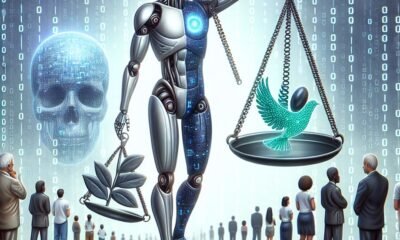Business
Early Member of Google’s AI Team: It’s Too Late to Get a Ph.D. in AI

The cutthroat race for AI talent has seen tech giants like Meta dangling exorbitant bonuses in the hundreds of millions to lure talent.
But Jad Tarifi, who founded Google’s first generative AI team, told Business Insider that he would not encourage people to get a Ph.D. just to cash in on the AI hype.
“AI itself is going to be gone by the time you finish a Ph.D. Even things like applying AI to robotics will be solved by then. So either get into something niche like AI for biology, which is still in its very early stages, or just don’t get into anything at all,” Tarifi said.
Tarifi, 42, got his Ph.D. in AI from the University of Florida in 2012. He joined Google in 2012 and spent nearly a decade with the search giant. In 2021, Tarifi started his own AI startup, Integral AI.
Tarifi said doctoral studies are an ordeal that only “weird people” — much like he was — should undertake, because it involves sacrificing “five years of your life and a lot of pain.”
“I don’t think anyone should ever do a Ph.D. unless they are obsessed with the field,” Tarifi said.
And now, with the world advancing as fast as it is, you can achieve a lot more outside school, he added.
“If you are unsure, you should definitely default to ‘no,’ and focus on just living in the world,” Tarifi said. “You will move much faster. You’ll learn a lot more. You’ll be more adaptive to how things are changed.”
Degrees that take a long time to complete, like law and medicine, are in trouble, too, Tarifi said.
“In the current medical system, what you learn in medical school is so outdated and based on memorization,” he said, adding that people might end up “throwing away eight years” of their lives for their advanced degrees.
Tarifi said people who want to thrive in the age of AI should develop social skills and empathy. This is because while the hard sciences can be learned, expertise at prompting and using AI involves “emotional attunement” and “good taste.”
“The best thing to work on is more internal. Meditate. Socialize with your friends. Get to know yourself emotionally,” Tarifi said.
Tarifi said that when it comes to AI, one does not need to master every single detail to work in the industry.
“I have a Ph.D. in AI, but I don’t know how the latest microprocessor works,” Tarifi added. “For example, you can drive a car, but you might not know every single thing about the car. But if you know what to do if something goes wrong, that’s good enough.”
Tarifi isn’t the only one who says that leaning into one’s passions will become critical when navigating a world disrupted by AI.
Paul Graham, the founder of startup incubator Y Combinator, said in an X post on August 5 that low-level programming jobs are “already disappearing” because AI is “good at scutwork.”
“So I think the best general advice for protecting oneself from AI is to do something so well that you’re operating way above the level of scutwork,” Graham wrote.
“It’s hard to do something really well if you’re not deeply interested in it,” he added.
Business
AI for Small Businesses

NASHVILLE, Tenn. (WTVF) — On this episode of SCORE Connect, host Anna-Vija McCloud is joined by Jennifer Renshaw, Founder & CEO of Brand Mark Digital to discuss AI for small businesses.
Visit https://brandmarkdigital.com/ for more information.
How Can SCORE Nashville Help You on Your Business Journey?
Visit https://www.score.org/nashville to learn more.
Business
Small business owners: your co-founder will be an AI agent

When we think of AI, we often picture Silicon Valley giants or futuristic sci-fi movies. But in the arena of global trade and e-commerce, AI is no longer a futuristic concept — it’s rewriting the rules of global trade and reshaping competition. Across Alibaba.com’s findings from over 20,000 submissions to its CoCreate Pitch entrepreneurship competition, over 60% of U.S. small businesses plan to adopt AI tools in 2025.
Why? Because AI isn’t a trend—it’s a tsunami, and ignoring it could be the end for many.
New globalization runs light
Globalization no longer requires armies of specialists or decades of supply chain buildup. Today, a lean team with AI-powered tools can tap into global markets faster than ever.
These tools, like real-time translation APIs and predictive analytics, enable a two-person startup to sell across continents overnight, dismantling persistent barriers such as language differences, gaps in foreign market knowledge, and the difficulty of establishing cross-border trust.
This heralds the era of “micro-multinationals”: A two-person design studio startup could sell products across 20 countries by leveraging AI-generated market insights. Tasks that once required entire departments can now be done with the push of a button — and this is just the beginning.
Meet your co-founder: the autonomous AI agent
The rise of autonomous AI agents is further taking the game to the next level. Imagine a 24/7 co-founder who never sleeps, tirelessly sorting suppliers, negotiating deals, handling orders, and managing logistics.
For global trade, AI agents do not just find products but also evaluate suppliers, facilitate communication, process orders and even manage logistics. Think of it as having a powerful search engine like Chat GPT but for B2B trade, capable of sourcing across the entire digital landscape, combined with the talents of a team of professionals to handle the end-to-end process of sourcing and delivery. And it’s not a fantasy, Alibaba’s own Accio agent is already automating 70% of traditionally manual workflows for B2B buyers across the world, compressing fragmented processes including product ideation, prototyping, compliance checks and supplier sourcing into a seamless, AI-powered cycle.
AI is real. It’s here.
Why the $30 trillion B2B industry is leading the AI charge
While consumers are still warming up to AI, B2B decision makers are already racing ahead for three reasons:
1. Scale: Large scales of production and consumption invoke economies of scale, especially in a $30 trillion B2B industry. For instance, a mid-sized manufacturer can use AI to reduce supply chain costs by 15% through predictive maintenance, which is revolutionary to a business when millions of dollars are at stake.
2. Speed: For many small businesses, AI can drastically shrink a request for proposal process from weeks to hours by automating vendor comparisons and contract drafting.
3. Search transformation: B2B buyers will expect platforms in the future to understand extremely specific queries like “show me 3-D printed parts for aerospace that meet FAA specs,” and produce results that take them directly to a right supplier’s page. The future of B2B search is no longer about search engine optimization (SEO), but about generative AI engine optimization.
Small businesses: start small but start now
Yes, it can be daunting for a small business owner to embrace AI, but you don’t have a choice, you either adapt or risk vanishing in the dust of competitors who do.
Good news is, you don’t need a full AI incorporation overnight. Start small – perhaps implementing a customer service chatbot or AI data analysis tool – and scale up from there.
The future belongs to those who treat AI not as a luxury, but as essential infrastructure.
The opinions expressed in Fortune.com commentary pieces are solely the views of their authors and do not necessarily reflect the opinions and beliefs of Fortune.
Business
AI: Central Pillar of Business Transformation

AI is now a central pillar of business transformation, driving competitiveness, efficiency, and innovation, says CII-Protiviti report.
The “Vision AI: Trends and Strategic Insights 2025” report, released on Thursday, highlighted AI’s pervasive impact across various sectors.
“The question of whether AI will change our world is no longer hypothetical — we are seeing the impact everyday. From transforming industries to reshaping how we work, AI has moved from opportunity to impact. AI literacy and fluency are no longer optional; they are mission-critical for every industry, every leader, and every enterprise. The opportunity to build with AI is immense,” Microsoft India & South Asia President Puneet Chandok said.
In the financial services industry, AI is redefining trust, regulation, and fraud detection.
By incorporating intelligence into risk assessment, compliance functions, fraud detection, and customer engagement, financial institutions are achieving precision and flexibility in a sector where reliability is paramount, the report said.
Manufacturing and industrial domains, which are primarily driven by volume and scale, are optimising production and supply chains through predictive intelligence.
Retail and e-commerce are witnessing unprecedented changes with AI-driven personalisation and demand forecasting.
“Through transaction data, businesses now personalise customer journeys, enabling enterprises to forecast demand, optimise pricing and deliver seamless, unified commerce experiences,” the report noted.
Healthcare is seeing breakthroughs in diagnostics, treatments, and accessibility with AI.
Enterprise technologies and IT services are leveraging AI for digital transformation, cybersecurity, and cloud cost optimisation.
Real estate and hospitality are adopting intelligent automation for efficiency and enhanced guest experiences.
The automobile sector is incorporating AI-powered safety features and autonomous engineering, while energy, chemicals, and utilities are utilising AI to manage demand, optimise production, and reduce environmental impact.
For India, AI is not merely a technology shift but a national priority to enhance competitiveness, inclusive growth, and long-term resilience, CII Director General Chandrajit Banerjee said.
-

 Business6 days ago
Business6 days agoThe Guardian view on Trump and the Fed: independence is no substitute for accountability | Editorial
-
Tools & Platforms3 weeks ago
Building Trust in Military AI Starts with Opening the Black Box – War on the Rocks
-

 Ethics & Policy1 month ago
Ethics & Policy1 month agoSDAIA Supports Saudi Arabia’s Leadership in Shaping Global AI Ethics, Policy, and Research – وكالة الأنباء السعودية
-

 Events & Conferences4 months ago
Events & Conferences4 months agoJourney to 1000 models: Scaling Instagram’s recommendation system
-

 Jobs & Careers2 months ago
Jobs & Careers2 months agoMumbai-based Perplexity Alternative Has 60k+ Users Without Funding
-

 Education2 months ago
Education2 months agoVEX Robotics launches AI-powered classroom robotics system
-

 Funding & Business2 months ago
Funding & Business2 months agoKayak and Expedia race to build AI travel agents that turn social posts into itineraries
-

 Podcasts & Talks2 months ago
Podcasts & Talks2 months agoHappy 4th of July! 🎆 Made with Veo 3 in Gemini
-

 Podcasts & Talks2 months ago
Podcasts & Talks2 months agoOpenAI 🤝 @teamganassi
-

 Education2 months ago
Education2 months agoMacron says UK and France have duty to tackle illegal migration ‘with humanity, solidarity and firmness’ – UK politics live | Politics






















